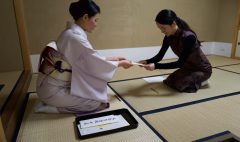识人之术面相/体态/走路/声音The Art of Reading People: Face/Body/Walking Style/Voice
December 14, 2024 2024-12-14 19:51识人之术面相/体态/走路/声音The Art of Reading People: Face/Body/Walking Style/Voice

识人之术面相/体态/走路/声音The Art of Reading People: Face/Body/Walking Style/Voice
The Art of Reading People: Face/Body/Walking Style/Voice
How to Understand a Person’s Personality Through Their Face, Posture, Walking Style, and Voice
It’s commonly known that a person’s face can reveal a lot about their personality. Beyond the face, however, other elements like posture, walking style, and even the voice also offer insights into who someone truly is. For instance, when a person is angry, you can immediately tell from their facial expression. If someone remains in a constant state of anger, their facial muscles form muscle memory, which shapes their facial features over time.
When it comes to posture, we unconsciously adopt certain body positions when feeling down. If someone is consistently in a state of sadness or frustration, their posture will solidify into muscle memory, creating a permanent physical expression of that feeling. Walking style also reflects a person’s energy and personality. If someone lacks energy and is in a casual or carefree state of mind, they’ll naturally walk in a slow and unhurried manner.
The voice is another way our body expresses itself. Our bodies function as instruments that produce sound, and the healthier and more open our bodies are, the more harmonious and natural the sound we produce. However, if any part of the body is blocked or restricted, it will affect the sound we emit. Different voices correspond to different personality traits. Some people’s voices come from the chest, others from the throat, and some even sound as though they resonate from the top of the head. Each type of voice carries a distinct personality signature.
If you are particularly perceptive, you can even identify which personality type corresponds to which sound. Interestingly, you don’t have to learn these things in a formal way. You can simply simulate them. For example, when you observe someone’s face, try to feel what it would be like if you had that same face. How would you feel in that state? If this person maintains such a facial expression over time, it reflects their ongoing emotional state. Similarly, by mimicking someone’s walking style, you can feel what it’s like to walk in that particular way. The energy a person carries in their walk influences their personality.
The same goes for the voice. By imitating someone’s voice and experiencing how it feels to produce that sound, you can understand the type of energy they carry. If someone maintains that same sound for a long period, it will become a core part of their character.
Understanding a person doesn’t require memorizing a bunch of facts. Instead, it’s about sharpening your perception. By placing yourself in another person’s body, you can truly feel their energy. If a person is in a certain energy state for a long time, their personality will align with that state. Therefore, analyzing a person’s personality through their face, voice, posture, and walking style isn’t a complex science. It’s simply about enhancing your awareness.
The reason we often fail to perceive others accurately is that our own bodies are blocked, and our ability to empathize hasn’t fully developed. When we judge others harshly, we resist experiencing their energy. We may refuse to put ourselves in their shoes because we don’t like their face, their posture, or their walking style. But when we reduce the blocks within our bodies, and when we clear our energy, we can better understand both ourselves and others.
This kind of understanding is non-judgmental; it’s based on acceptance and empathy. Through this deeper understanding of others, we may find ourselves in a better position to help them. That’s all for today’s share. If you found this helpful, feel free to like, share, or recommend. Thank you!
识人之术面相/体态/走路/声音
如何通过面相、体态、走路姿势和声音看透一个人的性格
我们都知道,通过面相可以看出一个人的性格。除了面相外,体态、走路的姿势以及我们的声音,同样能反映出一个人的内在特质。举个例子,当一个人生气时,你可以从他的面部表情中看出情绪的波动。如果他长期处于生气的状态,他的面部肌肉会形成肌肉记忆,这就是面相的形成。
关于体态,当我们感到沮丧时,身体的姿态会不由自主地表现出来。如果一个人长时间保持沮丧的心情,他的身体姿态也会形成肌肉记忆,最终呈现出固定的状态。而走路的姿势也能反映出一个人的能量状态。如果一个人的能量不充盈,性格可能会显得随意和懒散,走路时自然也会表现出拖沓和不紧凑的姿势。
声音是我们身体的另一种表达方式。我们身体是发出声音的乐器,身体更健康、通透时,发出的声音就会更加和谐、自然。相反,如果身体某部分存在堵塞,无法正常发出声音,声音也会呈现出一种特定的状态。不同的声音也代表着不同的性格特点。有些人的声音来自胸腔,有些人的声音来自喉咙,甚至有些人的声音直达头顶。每种声音都承载着不同的个性特征。
当然,如果你足够敏锐,你可以通过这些细节非常准确地识别声音与性格的匹配。其实,我们不需要刻意学习这些知识,只需要通过模拟。比如,当你看到一个人的面相时,你可以将自己的意识投入到这个面相中,感受如果你也拥有这个面相,会有什么样的感受。如果这个人长期保持这种面相,那么他就长期处于这种感受中。同样,当你模仿一个人走路的姿势时,也可以在模仿过程中体验到他在这种姿势下的感受。一个人长期感受这种能量,也就形成了他的性格。
声音也是如此。通过模仿他人的声音,感受如果自己发出这个声音,会有什么样的感受。若一个人长期保持这种感受,那么他的性格自然也就形成了。
要了解一个人,并不需要搜集大量信息,背下无数细节。我们只需要提升感知力,尝试将自己放入另一个人的身体,体验他的能量状态。如果他长期处于这种状态,他的性格便是如此。因此,从面相、声音、体态到走路的姿势,我们并不需要太多复杂的科学知识或记忆,只需要提升自己的感知能力。
我们之所以感受不到他人的状态,往往是因为自己身体内部的堵塞太多,或者我们的共情能力尚未开发出来。而当我们带着强烈的评判去看待他人时,我们便不会愿意进入到对方的身体,也无法体会到他的真实状态。因此,我们需要减少身体内的堵塞,使能量更加清静,减少对自己和他人的评判,这样才能更好地了解自己,也能更深刻地理解他人。
这种了解不带有评判,而是带着接纳与理解。在深入了解他人的过程中,我们或许能够真正帮助到他人。今天的分享就到这里,如果你觉得它对你有所帮助,欢迎点赞、转发、推荐!谢谢!









